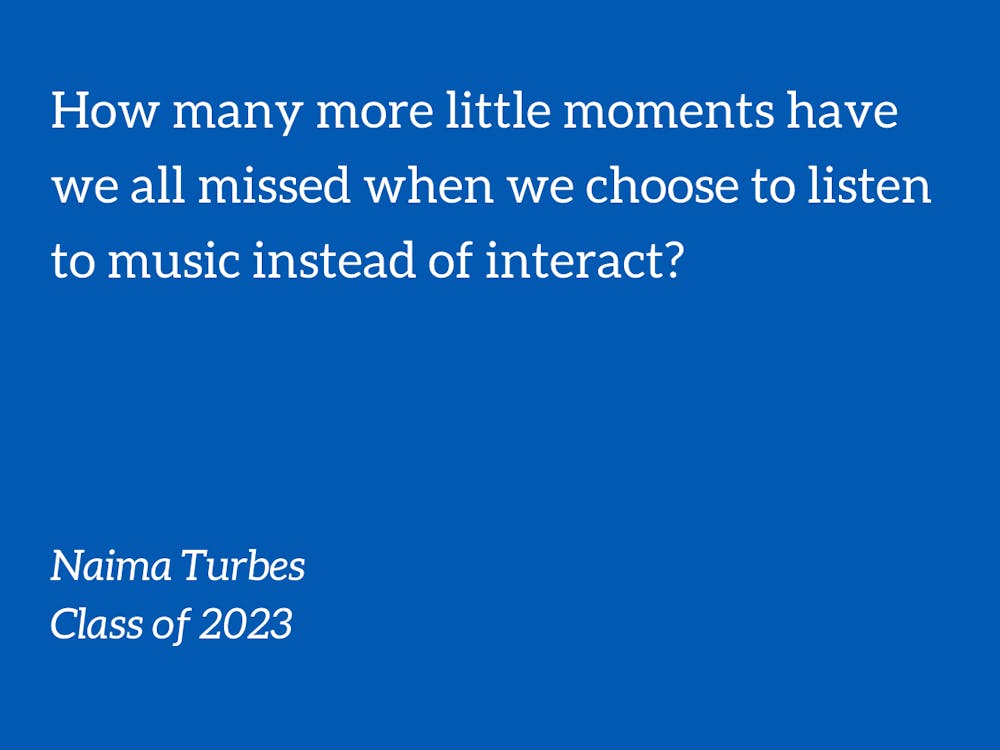Spotify is undoubtedly my most used app. On an average, busy day, I open the app about fifteen to twenty times to change music or peruse playlists. That is not to include the many minutes I spend walking to and from class with music. As personally entertaining and meaningful that I find music, I have grown to better understand the way that music, especially this constant sense of sound, separates us from what could be real connections. In fact, I’d argue that music more than often waters down our connections today.
I am particularly inspired to write about this after one of the top ten most embarrassing moments of my life last week, when I was walking through the quad to an afternoon lifting practice for the track team. As per usual, Drake was blaring in my ears, preparing me mentally to get huge. I looked up and across the quad to see two of my teammates racing towards me and swirling their hands in the air. Apparently, they had been calling my name for five minutes, excited to celebrate a job offer, and I was long gone in The Weeknd's voice. How many more little moments have we all missed when we choose to listen to music instead of interact?
Parties are a perfect example of music watering down interactions. I love getting down on the dance floor and screaming Fetty Wap until my throat hurts as much as the next person, but I have never had a substantial conversation at a party. Or, for that matter, a conversation at all. Instead, I find myself standing next to people I haven’t seen outside of an occasional shared class, only able to shout a couple inaudible words. Usually, they’re “doing great!” And school is “super busy!”
Then Fetty’s voice drowns out the conversation, and we smile and move on.
I almost wrote this column about my appreciation for music and its ability to drive connections between people. And in all honesty, I still love listening to and sharing music. When we all scream “Every Time We Touch” during a basketball game? Unbeatable. And as someone from an Atlanta community deeply entrenched in music culture, separating music from my everyday life feels particularly difficult. Even my own name, Naima, is a jazz song by the famous saxophonist John Coltrane. I have grown up learning about how music ties people together, expresses what words can’t say and is culture. All of these things are true. Yet at Duke, I have witnessed music also as a sense of distraction—a numbing agent—and thought that this separate, disconnected use of music deserved attention. And frankly, also that it deserved to be dismantled.
In fact, when I think about my own experience at Duke, I think more comes from silence. The silent moments in the car that force someone to talk about how they are really doing. Or a quiet, calming walk to class in the morning in the midst of a busy week.
There is this guy that lives on my floor of Hollows who is in two of my classes this year. We see each other maybe four to five times a day, and I swear our schedules are synched. But somehow, I have never said hello. Both of us give this knowing glance with AirPods in, a nod if we are feeling crazy, but that's the extent of our relationship—if you could call it that. Last Wednesday, my AirPods broke. A little water damage from a sweaty run did the trick, and I found myself standing in the elevator with this mysterious man for an awkward whole three minutes.
It was painful. Suddenly, the extent of our distant, mutual agreement not to interact felt heavy—it felt real. Out of guilt, I made a silent pact with myself to initiate a greeting the next time I saw him (If you are out there, hello, let’s be friends. Sorry that I have been so standoffish).
Sometimes silence is a little more honest. A little less numbing. Silence allows you to acknowledge your own actions (or lack of action) in broad daylight. Maybe you don’t have this same experience, or throwing in Airpods for an everyday activity is not your norm. But I would similarly encourage you to turn down the music, especially when listening alone. Music is this beautiful, expressive medium, and yet it can, like most things in life, be overplayed.
Naima Turbes is a Trinity junior and a Managing Editor of the Opinion section. Her column runs alternate Thursdays.
Get The Chronicle straight to your inbox
Signup for our weekly newsletter. Cancel at any time.

